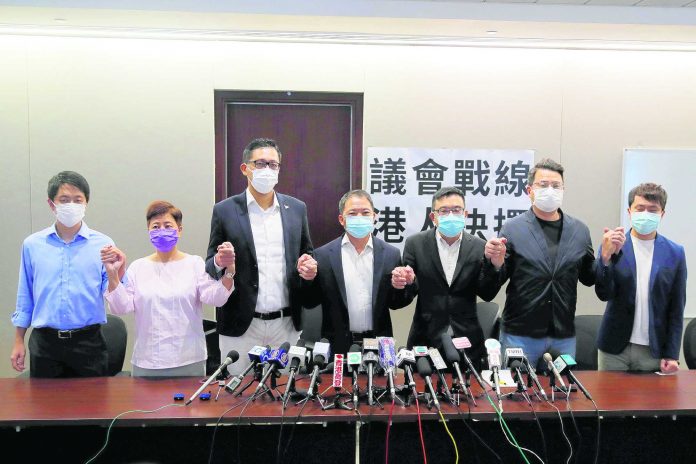The Hong Kong government on Thursday condemned the U.S. decision to suspend extradition and tax exemption treaties with the semi-autonomous Chinese city, saying it was being used as a pawn in geopolitics.
On Wednesday, the U.S. suspended its extradition treaty with Hong Kong, becoming the latest country to do so after Canada, Australia and Britain suspended such agreements. The U.S. also suspended an agreement with Hong Kong on reciprocal tax exemptions on income derived from the international operation of ships.
“The U.S.’ unilateral decision reflects its disrespect for bilateralism and multilateralism under the current administration and should be condemned by the international community,” the territory’s government said in a statement.
The government “strongly objects to and deplores the U.S.’ action, which is widely seen as a move to create troubles in China-U.S. relationship, using Hong Kong as a pawn,” it said.
The government said that bilateral agreements were not preferential treatment given to Hong Kong, but were negotiated in good faith to benefit both parties.
Hong Kong has faced mounting international pressure following Beijing’s implementation of a national security law which has been viewed as an attack on the “one country, two systems” framework under which the city has been governed since its return to China in 1997.
China’s foreign ministry said Hong Kong will also suspend its extradition agreement with the U.S. in response.
“I want to emphasize again that Hong Kong affairs are purely China’s internal affairs and no one should interfere,” said ministry spokesman Zhao Lijian, who urged the U.S. to “stop meddling in Hong Kong affairs.”
Since July 1997, Hong Kong has surrendered 69 fugitives to the U.S., with the U.S. extraditing 23 people to Hong Kong, according to official data.
Jeffrey Bader, a former U.S. diplomat, said the actions taken so far are unlikely to dissuade China.
“Hong Kong is an issue that’s going to be with us for quite some time, and in a frustrating way,” he said.
“It’s part of China and things that are internal to China, even if they have an international dimension, like Hong Kong and Xinjiang, the Chinese have a demonstrated disdain for outside opinion and are inflexible in reaction to it.”
Separately on Thursday, lawmakers from Hong Kong’s largest pro-democracy party, the Democratic Party, said they planned to hold a poll and debate to determine whether they will continue serving in the legislature another year, following an election postponement attributed to the coronavirus outbreak.
Opinions within the pro-democracy camp differ on whether lawmakers should boycott the extension of their terms or stay to have a voice in the legislature. Lawmakers in favor of boycotting say staying sets a precedent to delay elections.
“The public opinion is still very divided, we want the solidarity of the people,” James To, a member of the Democratic Party, said at a news conference. “We would prepare at least one debate in order … to have a comprehensive range of arguments and points so that the whole society can decide.”
The elections were to be held in September but city officials postponed them for a year. Critics say they feared the governing pro-Beijing party would lose seats if they were held on time.
Democratic Party lawmakers did not specify a time frame or details of the public poll.
Several pro-democracy lawmakers have already spoken out against serving another year in the legislature.
Ray Chan, chairman of the People Power party, said on Twitter he would boycott the “illegitimate” extension and that accepting the appointment would mean accepting the authority of city leader Carrie Lam’s government and would allow Beijing to “arbitrarily change the term” of legislators.
“It’ll open the floodgate for all kinds of meddling for years to come,” Chan said.




















